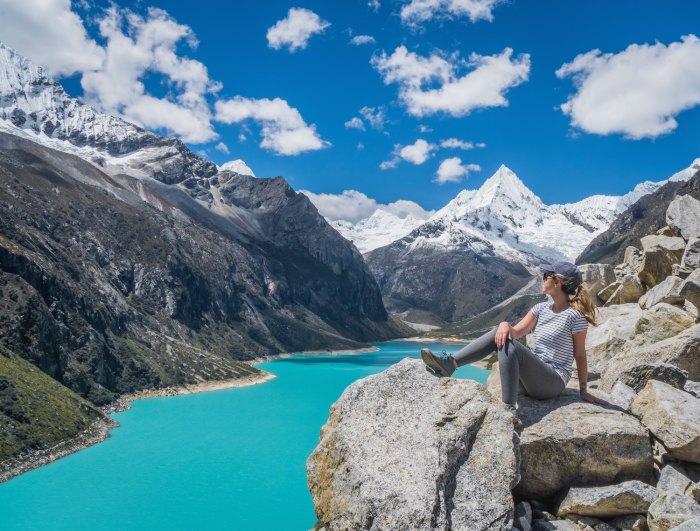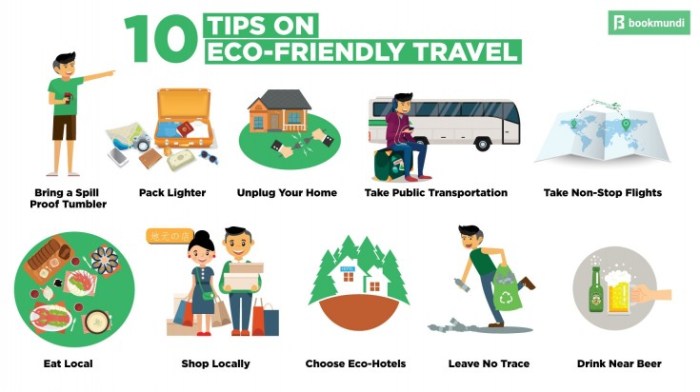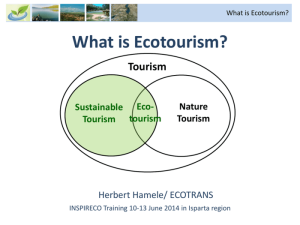
Embark on a journey towards sustainable travel with Eco-Friendly Travel Ideas at the helm. Discover how to lessen your carbon footprint, explore green transportation options, and uplift local communities along the way.
Delve into the realm of ecotourism and its vital role in conservation efforts, understanding its benefits for the environment and communities worldwide, while uncovering inspiring projects that showcase its positive impact.
Eco-Friendly Travel Ideas

Traveling in an eco-friendly way is essential to reduce our carbon footprint and protect the environment. By making conscious choices, we can minimize the negative impact of our journeys and even contribute positively to the places we visit.
Reducing Carbon Footprint
One of the key ways to reduce your carbon footprint while traveling is to opt for sustainable transportation options. When possible, choose trains or buses over flights, as these modes of transport have lower emissions. If you need to fly, consider booking direct flights and flying economy class, as these options are more fuel-efficient.
Sustainable Transportation Options
- Use public transportation or bike rentals to explore the destination.
- Walk whenever possible to reduce emissions and immerse yourself in the local culture.
- Consider carpooling or renting an electric vehicle for longer journeys.
Supporting Local Communities
When traveling sustainably, it’s important to support local communities and businesses. Choose accommodations that are locally owned and operated, and dine at restaurants that source their ingredients locally. By purchasing souvenirs from local artisans and participating in community-based activities, you can contribute to the economic development of the region you’re visiting.
Ecotourism

Ecotourism is a form of sustainable travel that focuses on promoting conservation and responsible travel practices. It involves visiting natural areas to learn about the environment, support local communities, and minimize negative impacts on the ecosystem.
Importance of Ecotourism
Ecotourism plays a crucial role in promoting conservation by raising awareness about the importance of protecting natural habitats and wildlife. It helps fund conservation efforts, supports local economies, and encourages the preservation of biodiversity.
Benefits of Ecotourism
- Environmental Benefits: Ecotourism promotes the preservation of natural resources, reduces carbon footprint, and supports sustainable practices.
- Social Benefits: It creates jobs for local communities, preserves cultural heritage, and fosters respect for indigenous traditions.
- Economic Benefits: Ecotourism generates revenue for conservation projects, improves infrastructure in remote areas, and contributes to the overall well-being of local residents.
Examples of Successful Ecotourism Projects
- The Galapagos Islands: Strict regulations and sustainable practices have helped protect the unique biodiversity of the Galapagos while providing economic opportunities for local communities.
- Costa Rica: Known for its commitment to ecotourism, Costa Rica has established protected areas and sustainable tourism initiatives that benefit both the environment and local residents.
- Maasai Mara, Kenya: Community-based ecotourism projects in Maasai Mara have empowered indigenous communities to protect wildlife, preserve their culture, and improve livelihoods.
As we conclude our exploration of Eco-Friendly Travel Ideas and ecotourism, remember that small changes in our travel habits can lead to significant positive effects on the planet and local livelihoods. Let’s continue to journey responsibly for a greener, more sustainable future.
Popular Questions
How can I reduce my carbon footprint while traveling?
Opt for eco-friendly transportation, pack light, and choose accommodations with green practices.
What are some examples of sustainable transportation options for eco-friendly travel?
Consider biking, using public transportation, or carpooling to reduce emissions.
How can I support local communities and businesses while traveling sustainably?
Shop at local markets, eat at locally-owned restaurants, and participate in community-based tours.






